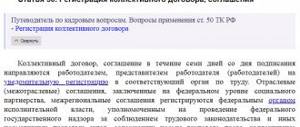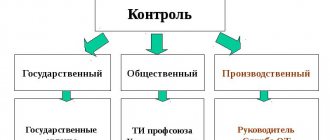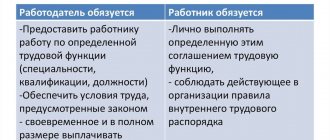The conditions for monitoring the implementation of a collective agreement (agreement) have been approved as legislative norms. But even this does not stop the parties to the social partnership from all sorts of tricks and violations that affect the well-being of ordinary workers. Therefore, it is advisable to analyze the procedure for control functions, who is vested with such powers and what liability is possible for violation of the implementation of the collective agreement.
Who should monitor the execution of the contract?
Article 51 of the Labor Code of the Russian Federation states that control over the implementation of the collective agreement is carried out by the following persons:
- Parties of social partnership. That is, on the one hand, these are employees, and on the other, employers. The workers may be represented by trade unions or workers specially selected for these purposes. The employer or his authorized representative acts as a manager.
- Labor authorities at the state or municipal level. Monitoring the implementation of the collective agreement is carried out by bodies at the level at which this document was concluded.
Contents and meaning of Art. 51 TK
The first paragraph states that control over the implementation of collective agreements and agreements can be carried out by the following entities:
- parties to social partnership;
- representatives of these parties;
- relevant authorities operating in the field of monitoring labor interactions between employers and employees.
It is further stated that when carrying out control activities, the listed parties must ensure that both each other and the relevant labor authorities are provided with the necessary data. The deadline for providing this information is one month from the date of receipt of the relevant request.
So, the reviewed article describes in detail the circle of participants in activities to verify compliance with the norms of collective agreements and agreements, as well as their responsibilities for providing the necessary information to both other participants and specialized regulatory structures.
The procedure for monitoring the implementation of a collective agreement by the labor authority
Monitoring compliance with the local document begins from the moment of its registration with the body regulating labor relations. They examine the submitted collective agreement to see if it contains provisions that worsen the conditions for workers compared to the conditions of labor legislation. These clauses will be deemed invalid. Notifications about this will be sent to the organization and the state labor inspectorate.
After receiving this notification, the organization must inform about this those persons to whom the illegal clauses of the collective document were previously applied. And then employees can appeal in court against the fact that these conditions are applied to them.
If in the future the organization applies invalid terms of the collective agreement, this will entail the application of liability measures to it.
Control of collective agreements
Definition 1
Monitoring the implementation of a collective agreement is carried out by the parties to this agreement, their representatives, as well as the relevant labor authorities and represents the control activities of these entities.
When carrying out this control, representatives of the parties must provide each other and the relevant labor authorities with the necessary information no later than 1 month from the date of receipt of the relevant request.
Note 1
If this information was not provided within the prescribed period by the employer or other person responsible for this provision, this is grounds for prosecution under Article 5.29 of the Code of Administrative Offenses of the Russian Federation.
Finished works on a similar topic
- Course work Control of collective agreements 430 rub.
- Abstract Control of collective agreements 250 rub.
- Test work Control of collective agreements 220 rub.
Receive completed work or specialist advice on your educational project Find out the cost
Monitoring the implementation of the collective agreement begins with notification registration with the labor authorities. Thus, a collective agreement that was concluded at the municipal level must be sent to the appropriate body that operates at the municipal level to register the agreement. Accordingly, if the contract is accepted at a higher level, it is sent to the higher organization. Thus, the general agreement, sectoral and intersectoral agreements that were concluded at the federal level are sent to the Ministry of Labor of the Russian Federation.
These authorities verify this agreement, comparing it with current labor legislation. If this agreement reveals provisions and conditions that worsen the employee’s position in comparison with current labor standards, the parties who signed the agreement are notified, as well as the relevant state labor inspectorate, and the prosecutor’s office may be notified.
Monitoring the implementation of the collective agreement, agreements within the organization
Monitoring within the organization of the implementation of the collective agreement is carried out in the form established in the organization. The legislation does not establish a specific form of control. Paragraph 2 of Article 51 of the Labor Code of the Russian Federation indicates the obligation of the parties to provide each other and the labor authority with information on the implementation of the collective agreement no later than one month after the request.
In practice, it has developed that the effect of a collective agreement and monitoring of its implementation is reflected in a report that is presented at a general meeting of employees of the organization. It is also posted on the Internet, the media or in the organization itself for free access and review.
The form of the report and its content are determined by the organization itself. It can also be presented in free form. This document is signed by the head of the trade union.
Who monitors the implementation of the collective agreement or agreement?
If we turn to the regulatory legal acts in the field of Russian labor law, then detailed explanations of the issue raised are given in Art. 51 Labor Code of the Russian Federation. This article states that control over the implementation of the collective agreement rests on the shoulders of the parties to the agreements themselves, as well as their official representatives and authorized authorities.
It should be noted that control over the implementation of collective agreements and agreements must take place completely openly and impartially.
In particular, all participants in such supervision must, if necessary, provide the opposing party with all necessary information obtained in the framework of their professional activities. Specialized bodies in the field of labor relations, which also exercise state control over the implementation of the terms of the agreement, must also be notified.
The provision of all information must be carried out within a period that does not exceed 1 month after the request is received from the competent authority. If the information is not provided, then administrative liability may arise, which is regulated by the Code of Administrative Offenses of the Russian Federation, namely Article 5.29.
Control Commission
To effectively organize the process, it is advisable to create a commission to monitor the implementation of the collective agreement. The purpose of its activities is to monitor the implementation of the collective agreement; informing the parties about the progress of cases; periodic summing up of results that are proposed for consideration at trade union meetings; taking measures to stop violation of the collective agreement.
Most often, the initiator of the creation of such a commission is a trade union. Its composition is selected by the trade union committee from among the members of the trade union. The number of members on the commission is determined by the size of the organization and the volume of work. The chairman of the trade union committee is elected as the head of the commission.
Control over the implementation of the collective agreement is carried out by the commission in the following ways:
- personal visits, tours of work places;
- receiving information or written documents about cases requiring control and taking appropriate measures.
In the course of its work, the commission prepares materials for consideration by the trade union in the following areas:
- Recommendations to the manager on eliminating detected violations of the collective agreement. If necessary, this documentation can be sent to labor authorities or law enforcement agencies.
- Consideration of draft orders that affect the labor and economic interests of workers. This may be the suspension, liquidation or reorganization of production, which will entail the reduction of workers or the deterioration of their working conditions.
- Termination of an employment agreement or contract with employees.
- Submitting claims concerning employees to court.
- Preparation and conduct of dialogue between the employer and government agencies.
Commission for monitoring the implementation of the collective agreement
In order to monitor the implementation of the terms of the collective agreement, special commissions can be created, the activities of which are regulated by Art. 35 Labor Code of the Russian Federation. The commissions may include representatives of the parties to the social partnership - that is, employers and employees, as well as members of trade unions operating in the organization.
As a rule, a commission monitoring compliance with the provisions of a collective agreement is formed at the stage of adoption of such an agreement, during the process of collective negotiations. The agreement reflects the procedure for forming the commission, its powers, the rights and obligations of the commission members. It is also possible to agree on provisions on payment for the activities of commission members, the procedure for generating reports on the implementation of collective agreements, submitted within a time frame determined by the parties for study by the commission.
Responsibility for non-compliance with the collective agreement
Responsibility and control over the implementation of the collective agreement are established by legislation at the federal or regional level. The Code of Administrative Offenses in Article 5.31 establishes the administrative liability of the employer for violation of the collective agreement. The fine is 30–50 minimum wages.
If an employee has violated the collective agreement, then such punishment is not applied to him.
In the process of monitoring the implementation of a collective agreement, the employer’s administrative responsibility arises if he:
- avoids participation in negotiations with the aim of concluding a collective agreement, violates the terms of negotiations;
- does not provide the necessary data for the implementation of collective negotiations or monitoring the implementation of the collective agreement;
- refuses to enter into a collective agreement without reason;
- violates or fails to comply with its terms;
- does not accept demands from employees and does not want to participate in the reconciliation procedure.
For all these violations, the Code of Administrative Offenses provides for an administrative fine as punishment.
Information on the implementation of the collective agreement (analytical report)
During collective bargaining, a list of information may be approved that the parties to the social. partnerships provide each other with the purpose of monitoring the implementation of the provisions of the agreement. Information may be provided in the form of an analytical report. The composition of the information contained in the certificate depends on the provisions of the agreement, as well as on the will of the parties to the social partnership.
For example, a collective agreement may establish the employer’s obligation to provide the commission for monitoring the implementation of the collective agreement within a certain time frame, an analytical report containing information about the fulfillment of the terms of the agreement.
You can develop the certificate form yourself, since the law does not require it. For example, it may look like a table (checklist), in one column of which the duties that the employer must fulfill are indicated, and in the other, information about their fulfillment.
***
Thus, each organization can create its own procedure for monitoring the implementation of the collective agreement. The only imperative requirement is contained in Art. 51 of the Labor Code of the Russian Federation, according to which the parties to social. partnerships have the right to request from each other information on compliance with the provisions of the collective agreement and receive information within a month. For failure to fulfill the obligation to provide information, administrative liability is provided for the employer.
Why do you need a collective agreement at an enterprise?
The purpose of this local regulatory document is to approve the rights and guarantees of the organization’s employees, additional to the legislation, taking into account the specifics of its work. The goal of economic and social protection of workers is also pursued through an appropriate level of salary plans, full and effective employment, safe conditions in the workplace, and profitable and effective work of the organization as a whole.
Principles and grounds on which a collective agreement is concluded:
- equality of two parties;
- compliance with government legislation;
- prescribed obligations, voluntary for both parties;
- the possibility of real implementation of accepted obligations;
- responsibility of the parties for the obligations of the collective agreement;
- contact between the parties and mutual response to changes in the situation.
Who monitors compliance with the collective agreement?
Control is exercised by both the parties to the social partnership (i.e., the parties to the agreement) and their representatives. State bodies, for example, state labor inspectorates, also have the right to monitor compliance with legal requirements in organizations and individual entrepreneurs, including compliance with the provisions of collective agreements.
For clarity, we provide information about the inspectors in the table.
| Who monitors compliance with collective agreements? | Information about inspectors |
| Representatives of employees from among the organization's employees | The interests of employees can be represented by their representatives, who are elected at general meetings of employees. According to Art. 31 of the Labor Code of the Russian Federation, if an organization does not have a trade union, or if less than 50% of the organization’s employees are members of a trade union, workers have the right to gather and elect their representative by secret ballot. |
| Representatives of workers represented by trade unions, trade union associations | Trade union organizations, which comprise more than 50% of employees, have the right to represent the interests of all employees, even those who are not members of a trade union. In a situation where a trade union includes less than 50% of employees, employees who are not members have the right to authorize this body to represent their interests. |
| Employer | The interests of the employer are represented by the sole executive body of the company, for example, its director. An individual entrepreneur represents his own interests, being an employer. |
| Employer representatives | The sole executive body of the organization (director, general director, etc.) has the right to issue an order assigning responsibilities for monitoring compliance with the collective agreement to one of the organization’s employees, who will be its representative. |
| Government bodies | At the stage of registration of a collective agreement, the social authority. protection, which conducts the procedure, determines whether the collective agreement violates the rights of the organization’s employees or not. In addition, this body forwards the contract to the state labor inspectorate, which is a supervisory body and has the right to check whether the provisions of the contract are being observed in the organization. |
What a collective agreement can and should regulate
The document may contain sections affecting absolutely all the interests and rights of employees of this organization:
- remuneration - its form, size, types and conditions of bonuses, various benefits, compensation; how wages are regulated in connection with rising prices, increasing inflation, as well as the dependence of wages on the achieved economic and other indicators of the organization’s performance;
- the employment system at the enterprise, the possibility of retraining, conditions for dismissal of workers;
- length of work and rest time, vacation system;
- labor protection points, ensuring safe working conditions;
- obligations for certain categories of workers, for example women, youth, veterans, young professionals, disabled people, families with children, etc.;
- responsibility of employees and employer;
- health protection of workers at the enterprise;
- how work should be carried out when monitoring the implementation of a collective agreement.
The following commentary to Article 51 of the Labor Code of the Russian Federation
If you have questions regarding Art. 51 of the Labor Code, you can get legal advice.
1. Monitoring the implementation of a collective agreement, agreement can be carried out by each of the parties to the collective agreement, agreement separately, directly by employees and employers, as well as by the executive labor body that carried out the notification registration of the collective agreement, agreement. Specific control mechanisms are determined by the relevant persons on the basis of the general principles of social partnership.
2. Either party has the right to demand from the other party the information necessary to exercise control. This information must be provided within one month from the date of receipt of the relevant request.
The essence of a collective agreement
The concept of an employment agreement is somewhat different from a collective agreement. An agreement is a legal act concluded between employees and employers to establish general principles for regulating labor, social and related relations. An agreement can be concluded from the administrative district level to the federal level. Also, such a document may be of an industry nature.
The agreement may contain the following sections:
- salary;
- procedure for working hours and rest;
- occupational Safety and Health;
- rules of social partnership.
In accordance with the scope of regulation, all agreements can be divided into the following types:
- general - at the federal level;
- regional - within a certain subject of Russia;
- sectoral - in certain areas of production;
- territorial - within the municipality.
Participants in different types of agreements
The composition of the participants entering into the agreement depends on the level at which the document is adopted. Types of collective agreements and their parties:
- general - national association of employers, government of Russia, state association of trade unions;
- regional – trade unions, regional associations of employers, executive authorities of a specific subject of the Russian Federation;
- sectoral – trade unions, associations of employers, labor authorities of a certain constituent entity of Russia;
- territorial - trade unions, associations of employers of a given area, local authorities.
What is government supervision over execution?
Notification registration of a collective agreement
The law determines that a collective agreement begins to work after its notification registration. This is where the control function of the labor authority begins.
After all negotiation procedures have been completed and the final version of the social document has been signed by the parties, no later than 7 days from the date of signing the document must be sent for notification registration.
Registration of contracts is carried out depending on the level of signing:
- at the federal level - directly by the central federal labor authorities;
- territorial or regional agreements - by the labor authority of the subject of the federation;
- local collective agreements – by municipal labor authorities.
How can an employer deceive an employee?
A collective agreement or agreement protects the rights of employees and gives them certain guarantees. This document acts as the constitution of the enterprise. Since control over the implementation of the collective agreement is carried out by both parties - both the employer and the employee? then the latter is protected in documentary terms.
But it is also important that the employee takes care of himself, can stand up for himself and achieve what he is entitled to.
Here are the most common violations by employers:
- the work provided for in the employment contract is not provided;
- assignment of duties and work not provided for by the concluded employment contract;
- illegal change of the date and form of salary payment;
- illegal deduction of part of wages;
- inappropriate organization of the labor process;
- illegal use of rest time to continue the work process;
- refusal to provide vacations;
- refusal to pay overtime hours.
Any violation of a collective or labor agreement is considered illegal.
Execution of the collective agreement and control over its operation
Its composition is selected by the trade union committee from among the members of the trade union. The number of members on the commission is determined by the size of the organization and the volume of work. The chairman of the trade union committee is elected as the head of the commission.
Control over the implementation of the collective agreement is carried out by the commission in the following ways:
- personal visits, tours of work places;
- receiving information or written documents about cases requiring control and taking appropriate measures.
In the course of its work, the commission prepares materials for consideration by the trade union in the following areas:
- Recommendations to the manager on eliminating detected violations of the collective agreement. If necessary, this documentation can be sent to labor authorities or law enforcement agencies.
- Consideration of draft orders that affect the labor and economic interests of workers.
Monitoring the implementation of the collective agreement, agreement
Where can you complain? You can go to different authorities with a complaint about the illegal actions of your employer:
- labor inspectorate;
- police;
- court;
- tax;
- prosecutor's office
If control over the implementation of a collective agreement (agreement) is carried out by the labor inspectorate, then it has the right to consider any disputes related to the implementation of labor and related processes. The competence of this authorized body is not limited.
If necessary, the labor inspectorate may involve other bodies in the proceedings.
Attention You can file a complaint with the prosecutor’s office in case of a gross violation of the law by the employer. You can go to court if the above authorities have not solved the employee’s problem. Many employees are hesitant to confront the illegal actions of their employer for fear of being fired.
Implementation of the collective agreement and monitoring its implementation
Responsibility of persons on the employer's side who evade participation in negotiations on concluding, amending or supplementing a collective agreement, or who violated the established deadline for the start of negotiations, or who did not ensure the work of the collective bargaining commission within the time frame specified by the parties. The fine is imposed in court. Persons representing the employer who are guilty of violation and (or) failure to fulfill obligations under the collective agreement are subject to the same fine. If the employer’s representatives avoid participating in conciliation procedures, in particular, do not provide premises for a meeting (conference) to put forward demands or interfere with its holding, a disciplinary sanction or a fine imposed in court is provided.
The employer or his authorized representative acts as a manager.
- Labor authorities at the state or municipal level. Monitoring the implementation of the collective agreement is carried out by bodies at the level at which this document was concluded.
The procedure for monitoring the implementation of the collective agreement by the labor authority Monitoring compliance with the local document begins from the moment of its registration with the body regulating labor relations.
They examine the submitted collective agreement to see if it contains provisions that worsen the conditions for workers compared to the conditions of labor legislation.
These clauses will be deemed invalid. Notifications about this will be sent to the organization and the state labor inspectorate.
Labor law
A collective agreement, or agreement, is an official document adopted by an organization that regulates labor and social relationships between the employer and the workforce.
Both parties need to know who at the enterprise can and should monitor compliance with the terms of the collective agreement.
If this work is carried out clearly and transparently, then the risk of conflicts between the parties will be minimized.
Who should monitor the implementation of the agreement Article 51 of the Labor Code of the Russian Federation states that control over the implementation of the collective agreement is carried out by the following persons:
- Parties of social partnership. That is, on the one hand, these are employees, and on the other, employers. The workers may be represented by trade unions or workers specially selected for these purposes.
collective agreement and control over its implementation
Types of collective agreements and their parties:
- general - national association of employers, government of Russia, state association of trade unions;
- regional – trade unions, regional associations of employers, executive authorities of a specific subject of the Russian Federation;
- sectoral – trade unions, associations of employers, labor authorities of a certain constituent entity of Russia;
- territorial - trade unions, associations of employers of a given area, local authorities.
How an employer can deceive an employee A collective agreement or agreement protects the rights of employees and gives them certain guarantees. This document acts as the constitution of the enterprise. Since control over the implementation of the collective agreement is carried out by both parties - both the employer and the employee? then the latter is protected in documentary terms.
Article 51. control over the implementation of a collective agreement, agreement
The collective agreement applies to all employees of the organization and individual entrepreneur (Part 3 of Article 42 of the Labor Code of the Russian Federation).
Collective agreements concluded in a branch, representative office or other separate structural unit of an organization also apply to all employees of the corresponding unit. In Art.
41 of the Labor Code of the Russian Federation clarified the conditions and terms for maintaining the validity of the collective agreement, taking into account the specific reasons that caused organizational changes in the activities of the employer.
Article 48 of the Labor Code of the Russian Federation must take into account that, firstly, it clearly defines the circle of subjects of a collective contractual legal relationship to which the agreement applies (Part.
3 and 4), and secondly, the conditions for joining the industry agreement concluded at the federal level for employers who did not participate in the conclusion of this agreement are determined.
If the parties have stipulated in the contents of the collective agreement obligations to refuse strikes under the conditions included in this agreement, subject to their timely and full implementation, and workers and trade union organizations do not fulfill these obligations, then if the strike is declared illegal, they may be held legally liable. Workers who started a strike or did not stop it the next day after the court decision declaring the strike illegal was communicated to the body leading the strike, which entered into force, may be subject to disciplinary action for violation of labor discipline.
Important In particular, a specific employee has the right to demand from the state control body over compliance with labor legislation or in court the provision of benefits and benefits established by a collective agreement or agreement. The facts established during the consideration of such applications do not require new proof when resolving applications of other employees regarding the application of the terms of a collective agreement or agreement to them. A specific employee to whom a collective agreement or agreement is applied may demand in court that the terms of the collective agreement or agreement be declared invalid and (or) ineffective.
Where can I complain?
With a complaint about illegal actions of an employer, you can go to different authorities:
- labor inspectorate;
- police;
- court;
- tax;
- prosecutor's office
If control over the implementation of a collective agreement (agreement) is carried out by the labor inspectorate, then it has the right to consider any disputes related to the implementation of labor and related processes. The competence of this authorized body is not limited. If necessary, the labor inspectorate may involve other bodies in the proceedings.
You can file a complaint with the prosecutor's office in the event of a gross violation of the law by the employer.
You can go to court if the above authorities have not solved the employee’s problem.
Many employees are hesitant to confront the illegal actions of their employer for fear of being fired. By law, you can submit an anonymous complaint to the inspection authorities. But if the problem is minor and does not affect a large number of employees, then most likely there will be no answer. If an anonymous complaint contains facts of a gross violation of the law that infringes on the rights of a large number of workers, you can expect an investigation by law enforcement agencies.
Commentary to Art. 51 Labor Code of the Russian Federation
1. Monitoring of the implementation of the collective agreement and agreement is carried out both by the parties to the social partnership and their representatives, and by the relevant labor authorities, who are obliged to provide each other with the information necessary for this within a month.
2. In accordance with the Model Regulations on Trade Union Legal Labor Inspection, approved by Resolution of the Executive Committee of the FNPR of September 26, 2007 N 4-2, legal inspections of trade unions also monitor compliance with collective bargaining agreements.








